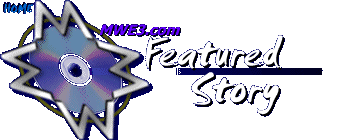Enter, Stage Left...
an interview with Jethro Tull guitarist Martin Barre
written by Robert Silverstein
So much of what makes rock legends Jethro Tull so great can be
heard on Stage Left, the new solo album from long time Tull
guitarist, Martin Lancelot Barre. Another highlight in a career that
has seen him literally define the art of rock guitar, Stage Left
is filled with Martin’s quintessential Jethro Tull guitar
sound.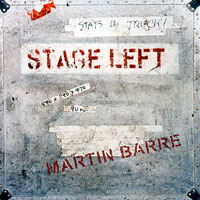 Featuring one vocal track amid an album of all instrumental rock fusion
gems, the 14 track 2003 CD release is Martin’s finest moment
yet as a solo artist. Interestingly, Jethro Tull founder Ian Anderson
has also just released his 2003 solo CD making '03 a vintage year
for long time Tull fans. Clearly Stage Left is everything the
Tull loyalist could want. Braced by a barrage of instrumental rock
guitar sounds that are clearly Tull-inspired, Barre’s soaring
electric guitar passages, baroque rock arrangements and bluesy rock
style lead guitar, techniques that defined the art of Jethro Tull
for nearly 35 years, rise to the occasion on Stage Left. Calling
from his home in Devon, England, Martin sounded quite enlivened by
the raised prospects that Stage Left will draw some well-deserved
critical acclaim and acceptance by music fans worldwide. The following
20th interview with Martin Barre took place Wednesday July 23, 2003.
Featuring one vocal track amid an album of all instrumental rock fusion
gems, the 14 track 2003 CD release is Martin’s finest moment
yet as a solo artist. Interestingly, Jethro Tull founder Ian Anderson
has also just released his 2003 solo CD making '03 a vintage year
for long time Tull fans. Clearly Stage Left is everything the
Tull loyalist could want. Braced by a barrage of instrumental rock
guitar sounds that are clearly Tull-inspired, Barre’s soaring
electric guitar passages, baroque rock arrangements and bluesy rock
style lead guitar, techniques that defined the art of Jethro Tull
for nearly 35 years, rise to the occasion on Stage Left. Calling
from his home in Devon, England, Martin sounded quite enlivened by
the raised prospects that Stage Left will draw some well-deserved
critical acclaim and acceptance by music fans worldwide. The following
20th interview with Martin Barre took place Wednesday July 23, 2003.
{editor - After seeing Jethro Tull play a memorable Summer 2008
concert on August 9, 2008 at Jones Beach on Long Island—where
they shared the bill on a beautiful New York night with rock guitar
favorite Peter Frampton—I then had the good fortune to meet with
Tull’s guitar icon Martin Barre and snap a few pics just after
the show. Going home, I later scanned my archives for this interview
I conducted with Martin following the release of his 2003 Stage Left
album. MWE3.COM is now happy to present the full length, unedited
original interview that first appeared in the September 2003 issue
of 20th Century Guitar magazine. Celebrating 40 years of Jethro Tull
musical history in 2008 with the promise of more to come, Martin Barre
remains a true icon of rock guitar history.}
MWE3: Martin!
MB: Hi how are you?
MWE3: How are you doing?
MB: Excellent.
MWE3: Great, great...I’m glad you called. You’re right on
time also.
MB: Oh good (laughter).
MWE3: There’s a bad storm in New York. If a lightening bolt hits
my telephone, call me back.
MB: Oh, right...(laughter) It’s not so great, the weather here,
so I know how you feel.
MWE3: Yeah? Are you in England now?
MB: Yeah, I’m at home in Devon. And we’re leaving this weekend
to fly back over to the States and we’ve got a month tour there.
MWE3: Oh, cool...
MB: Yeah...
MWE3: I know Anne Leighton is a great publicist, you must be happy
working with her.
MB: Yeah, we go back a few years. I’m pleased to talk to you.
Well, you send me your magazine, very kindly so. I’m very familiar
with it.
MWE3: Oh the mag sends you the issues.
MB: Yeah, it does. I’m really pleased about that.
MWE3: Yes well I like writing nice things about Tull.
MB: With the reissues, it’s nice to see you review it. It’s
nice. It’s a good mag.
MWE3: Actually I saw Tull for the first time at the Fillmore East
right after Aqualung came out in the spring of ‘71.
MB: Yeah, right...I remember those days.
MWE3: I wrote an article for 20th Century Guitar on the year 1969
and comparing it to 1999 and the artists that were coming back with
new stuff 30 years later. 1969 was like a paradigm shift kind of year.
MB: It was a pivotal year, wasn’t it? It was sort of an English
invasion to me. A lot of great bands were getting to tour at that
time. It was really exciting.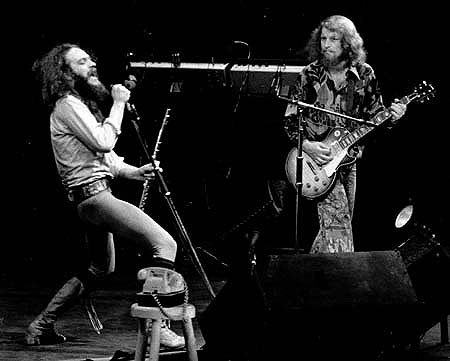
MWE3: I can remember the day I bought Stand Up!
MB: It’s the same with me. I remember those years a lot clearer
than sort of ten or twenty years ago where things tended to be very
routine. In those days, nothing was routine. It was, everyday anything
could happen. (laughter)
MWE3: In addition to 20th Century Guitar I also publish a music web
site called mwe3.com Have you seen that?
MB: No, I’m not a great computer user to be honest. I’ve
only started getting into computers. I’ve got my own web site.
I suppose it’s a selfish way of getting into it. I’m sort
of slowly...I just feel with computers I want to get involved in the
areas that I’m interested in so I’m sure to come across
your web site in my exploration of guitars and music which will be
obviously the reason for getting involved with it.
MWE3: Yes I interviewed Mike Oldfield for 20th Century Guitar and
I put the full interview up on mwe3.com I feel if it wasn’t for
pioneering progressive bands like Jethro Tull we might not’ve
had people like Mike Oldfield.
MB: Ah, he might disagree (laughter) but who knows...
MWE3: What’s your assessment overall of the internet and how
has it affected your music.
MB: Well on a personal level, it hasn’t at all. I’ve avoided
computer technology because I’m a very sort of hands on person.
What I do on a day to day basis is pick up a guitar, write music and
play. All the periphery of recording techniques, technology I try
and keep as simple as possible because I want to get my ideas down
as quickly as possible. I’m sort of impatient with getting into
new systems but obviously the new album I’ve done was done on
Soundscapes, but I just figure the guys that specialize in recording
on that system are a hundred times quicker than I would ever be so
I think the compromise is that I use the systems but I want somebody
else to operate it for me. I think that’s a sort of talent in
itself. And you have to acknowledge the studio engineer—who used
to have all the mystique of running a big desk and a 24 track, two
inch machine—that was guardedly secret in it’s day. Of course
nowadays, it’s easy...there’s nothing to it. And most people
realize that. But I think now, we’re going through the process
of where engineers are now going in to the computer side of it, through
necessity, and there’s obviously a lot to learn. And probably
five years down the line, it’ll be simplified and everybody’ll
be using it as a natural course. But, the internet...For information,
it’s great. It’s now very important but I think it can only
increase. There is a down side to it. You get the rubbish, you get
the pop-ups and you get the frustrations of computers crashing but
I think it can only grow. It can only become more and more important.
MWE3: I was so happy to hear this album and I was amazed at how Tull-inspired
the new Stage Left album sounds.
MB: Yeah, you know it’s part and parcel of me. I don’t think
my music reflects the music of Jethro Tull from my viewpoint but then
I’m really pleased that people say, ‘wow, there’s so
much of Jethro Tull in there.’ Well, I think that’s great
because that means there’s a lot of me in Jethro Tull and I want
there to be. I don’t want ‘me’ to be sort of a replaceable
item. Obviously, the sound of Jethro Tull is the flute and Ian’s
song writing is very, very important but I’m fiercely proud and
possessive of my part in Jethro Tull and it’s important to me
that it’s recognizable as a tangible thing.
MWE3: As a big proponent of instrumental guitar-based music I can
readily say that Stage Left is one of the best albums I’ve
heard in recent memory.
MB: I’m very pleased that you think so. When I recorded it, it
was such a pleasure to do...It’s the third album I’ve done
as a solo project. The thing about it was that everything fell into
place. I wrote the music over about six weeks and I had lots and lots
of ideas. But, they all seemed to work and it all fell into place
so readily. That, in itself made it such a pleasurable process. Mainly
it was me and engineer, Mark Tucker, who’s done all my albums,
working together. But, it was fun...he had fun and I had fun and there
wasn’t a day where we had a problem or difficulty or sat in the
control room thinking, ‘this isn’t working, what are we
going to do about it?’ It all worked and it was just...everything
clicked and because of it, I hope and think it comes out in the music.
That it’s very fresh because we didn’t have to work hard
at getting it right. I really enjoyed it but then, that can be a danger
I think because within Jethro Tull music we did albums where we locked
ourselves away for six months. Under Wraps was like that. It
was great fun but at the end of it...it was so self-contained, because
we had no outside contact...people didn’t like it. We loved it
(laughter) but nobody else did, because we sort of insulated ourselves
from opinion and it was a mistake. It’s always a worry. You can
sort of pat yourself on the back and think you’re really pleased
with it, have a big grin on your face, but it’s not always that
meaningful, but you feel that way. At the end of it, you’re really
open to whatever the reception’s going to be from people such
as yourself.
MWE3: Is Stage Left coming out in England as well?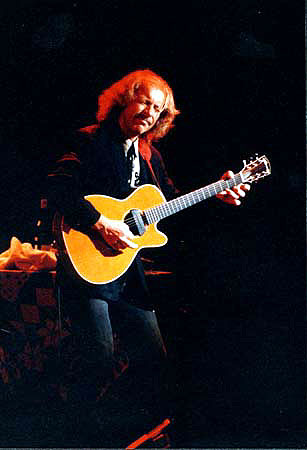
MB: It’s out in England on August 5th and I believe the release
date in America is August 10th.
MWE3: Who’s putting it out in England?
MB: It’s a label called R And M. They were sort of people who
worked for Chrysalis and EMI and they released Jethro Tull albums
down the line. As soon as I mastered the album, I sent it to them
and again, they loved it and they said, ‘right, we want to release
it’ and I thought, ‘wow!’ (laughter). And then I sent
it to Fuel 2000 in the States for the same reason, I have a relationship
with them through Jethro Tull, and as a sort of politeness, they were
the first to get the album. They said, ‘yeah, we want it’
and I just thought, ‘this is fantastic’, because it was
hard placing the first two albums. It all really worked out so well
for me and I’m hoping that in Europe...I’ve got some interest
for the rest of Europe and some very strong labels are interested
as well.
MWE3: That’s again the beauty of the internet. You can hook up
with people everywhere around the planet.
MB: It is, it’s great...information at your fingertips, immediately.
MWE3: What’s it like working with Fuel 2000. They’re doing
some great things. And the internet has leveled the playing field.
MB: That’s right. I think you have to match the company, the
record label, with the band. And it’s no good going to say, EMI
or some big label and getting a deal and thinking you’re going
to be a major player within that label. We felt, we wanted a label
that was at the same level as Jethro Tull. We wanted a smaller label
with acts like us. We’d rather be a main act on a middle-ish
label, rather than being on a major label and being one of the minor
acts and obviously the attention you would get from the team working
at the label would be sort of down the ladder a bit. It’s really
important...sort of mix and match. Fuel 2000 have been very good to
Jethro Tull. They put lots of work in and I think we match that. We’ve
always worked really hard. Promotion, touring, everything Jethro Tull
does, we do one hundred percent and I think that it’s generally
acknowledged in the business that if you’re with Jethro Tull,
they’re not going to mess you up. (laughter) They’re going
to play all their gigs, they’re going to give it a hundred percent.
And we just hope that comes through, that we never let up at all.
That we put a hundred percent effort into absolutely everything we
do. Obviously, that includes solo projects as well. There’s no
sort of throwaway element of doing a solo disc, a solo CD...getting
a bunch of mates and having a bit of a jam and saying, ‘oh!,
we’ll release that’ (laughter), sell a few for a bit of
a laugh. They are serious projects.
MWE3: I recently interviewed Mike Oldfield. Warners in the U.S. passed
on him for years during the ‘90s even though he was getting good
press in Europe.
MB: That’s the kiss of death, isn’t it? Well, we’ve
all been through it. We’ve all been through situations where
the label has let the act down in one way or another. It happened
to me with the solo albums, one in particular, and it’s happened
with Jethro Tull and it’s a hard lesson. You spend three, four
months, intense writing and playing in the studio to produce and album
and the worst thing that can happen to you is for it to be shelved.
It’s terribly heartbreaking.
MWE3: I don’t want to say anything about that. After all, EMI
still has to finish their Tull remasters!
MB: I’m not talking about EMI necessarily. I’m just talking
about...it’s happened to us over our career. I’m not saying
who did it. I’m not mentioning names. But, it happens to everybody.
It affects music right across the board. Everybody has little blips
in their career and it’s not always within their control.
MWE3: Will Fuel 2000 be bringing you over for some solo gigs?
MB: Yeah, well I’m talking to them now about doing it. Whatever
happens, I shall come over to promote it. It’ll either be playing
at music stores with a backing CD or I have a band that I can bring
over. I’m going to tour in Europe, in England, and hopefully
I can work out the economics to come over to the States as well.
MWE3: After playing Stage Left clearly these instrumentals
would sound right at home at a Jethro Tull concert.
MB: Yeah, well I play at least one instrumental of mine at a Jethro
Tull concert every night and I chop and change them so one night it’ll
be a bluesy one, another night an acoustic one. But I toured with
the first two albums so I’ve got lots of material between the
three of them now. It’d be good. It was a successful tour with
the first two albums so I know it could only be better.
MWE3: Has Ian Anderson heard your new album? Have you gotten any feedback?
MB: He’s very, very supportive. Ian helped me along the way with
suggestions and putting a word into the right ear, I mean he’s
been really good about it and I’m pleased to say that he’s
put his whole weight behind it and he’s said some very nice things
about it as well.
MWE3: It’s amazing that Ian has also just released a new solo
album on Fuel 2000. Is this a coordinated Tull attack or something?
MB: No...no it’s coincidental but I think the coincidence is
that we had a bit of a breathing space between tours so...we finished
last September and then we worked on the road till this April so there’s
a big window of opportunity to do a solo album. I mean, I’d already
decided I was going to do it six months before that. Ian’s like
me, he’s always writing. Where you get a week off, you go into
the studio and you get your guitar out (laughter) and you start writing
music. So it’s a continual process. I don’t think either
of us suddenly find ourselves with a few months or so...(saying) ‘right!
what shall I do now? Oh! we’ll do a solo album!’ (laughter)
I’m sure now I'll be writing other bits of music. And as we speak,
the whole thing will start again. And then I’ll have every intention
of doing more solo projects.
MWE3: Isn’t Fuel 2000 planning a new Jethro Tull Christmas CD
for next month?
MB: Yeah, that’s right. That’s recorded and going to be
released this October.
MWE3: Wow.
MB: So there’s a lot of stuff out there.
MWE3: I don’t know why I’ve always associated Tull’s
music with that time of the year. I know there’s a remake of
the “Ring Out, Solstice Bells”.
MB: Yeah... wanted to re-record all the Tull classics and then there’s
some Christmas carols that arranged and then there’s some new
material. One off my album and I think three tracks off Ian’s
solo album
MWE3: One off the new album?
MB: One of mine...”Winter Snowscapes” on it.
MWE3: Oh! Okay, “Winter Snowscapes” is also on the Christmas
album.
MB: That’s right, yeah.
MWE3: Wow,...excellent.
MB: It’s like a bonus track.
MWE3: Not a hidden track...it’s listed?
MB: It’s listed but it’s a sort of bonus one, yeah.
MWE3: Oh, it’s a Tull version of “Winter Snowscape”?
MB: Well, it’s the same piece of music but with flute on it.
MWE3: Oh, okay.
MB: So it’s slightly different.
MWE3: Tull should consider doing a Hanukah song. (laughter) It would
be perfect for the flute and guitar!
MB: Well...who knows? We’re broad minded, ya know?
MWE3: I thought it would be cool to hear Tull doing an instrumental
of the theme from Exodus. (laughter)
MB: (gives a good hearty laugh) Well, see I play flute and that’s
one of the first things I learned on flute so I’m ready!
MWE3: Yeah I just reviewed a new surf guitar album of Jewish folk
songs called Meshugga Beach.
MB: Yeah, right...sounds good.
MWE3: So you recorded the Stage Left album at your home studio?
MB: Yep.
MWE3: I read you have three recording studios but you said you’re
not really into all the technology cause you find it a little distracting.
MB: Well...yeah I wouldn’t say I’m not. I’m into it,
but the three studios...one’s a mixing studio and it’s sort
of resident by a couple of guys that use that studio just to do remixes.
And there’s a sort of self-contained thing going on there. And
then I have a studio that’s mine, that’s analog, and I’ve
done everything I do in my studio, and then the main studio is a working
professional studio. Obviously, that’s where I take my work eventually
to put drums on and whatever needs dubbing and to master everything.
And that’s always hard disk. I mean, I am into it, but as I said
before...it’s like me playing keyboards. I can play basic keyboards,
it’s better somebody does it that knows what they’re doing!
(laughter) I think it’s knowing your limitations. At some point
in time when I’ve got sort of months and months of nothing to
do, then maybe I’ll start getting into something like Soundscapes
just to sort of see how it works and fiddle about with it. But at
the moment my priority is writing and playing.
MWE3: With so much modern technology did you take advantage of that
during the making of Stage Left?
MB: Well I did. And it’s a very difficult judgment to know
where you draw the line where it’s so easy to say ‘let’s
just copy that bit of guitar (laughter) over to the next five verses’.
Only the musician can make a judgment on what’s fair and what’s...I
don’t like to use it in a way that I would call cheating. I like
to play everything live. I’ve used it in a sensible way and I’ve
tried to keep it where it’s ninety nine percent live guitar playing
and occasionally use the computer. If there’s a finger noise
on a string the computer can take that out and I think ‘well
that’s great, that’s fine’. But at the end of it, it’s
gotta be somebody playing an instrument. And I don’t like to
cheat.
MWE3: Did you use a lot of overdubbing on the album?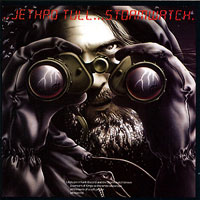
MB: No, not too much, because I don’t like to get into the area
where everything gets so busy. And I love to have a lot of space around
the guitar parts and I like a lot of harmonizing. I love the second
guitar parts to fill the harmony parts or a counter melody. Another
thing I used a lot was bazouki and mandolin, sort of doubling lines
with them for a textural thing because I didn’t use synthesizers
or keyboards. They’re very demanding sonically and of course
they’re in the same frequencies that guitar operates (in) so
I wanted to have a very complete sonic picture just with guitars and
stringed instruments that I was playing. So, there’s a lot of
textures in there but it was important that there was a main guitar.
Lots of textural things. I do love lots of acoustics. I quite like
the sound of acoustics with mandolins and bazoukis doubling and harmonizing
lines...it’s a sort of lovely, fat, stringy sound. I really enjoy
doing that.
MWE3: Could you mention some of the guitars you used on the new album?
MB: Yeah! On stage I use a Fender Strat. I just use one guitar. It’s
a fat Strat with the humbuckers, and that sort of gets every sound
I need. I quite like it as a working instrument. But then for recording,
the PRS (guitar) was a bit fatter with a really overdriven sound.
In the studio you can be a bit more picky about getting absolutely
the sound you want to. I have about three different Fender Strats
with different pickups on them I use. One with the humbucker, the
fat Strat. And I use one with EMG’s on and then I have a regular
Strat with Fender Noiseless pickups. And they all sound a tiny bit
different and you have the luxury of using anything you want in the
studio. (I use) the PRS guitar for really big fat guitar sounds because
I think when you’re recording you do notice the difference. They
are big, they sound really big and meaty. You play back a track through
a tiny, little hi-fi system, it does sound big even at very low volume
and I think that’s why I use the PRS. But then, I twiddle around
with an old Mustang that I used for chords and then I have a Manson
with a wang bar on it for different bits. I’ve got a lot of guitars.
I use a 1961 335, and I used that as well. I quite like the sound
of that. In general, I don’t mess with guitars. I just use a
guitar (laughter) and just play the thing! I started recording the
master guitars and everyday I sort of take over two or three guitars
from my studio in the big studio. I have the luxury of being able
to experiment with different instruments and a lot of different acoustic
guitars. I’ve got a Taylor, I’ve got a Manson, I’ve
got a Santa Cruz, I’ve got a Martin classical, I’ve got
a Manson mandolin, a bouzouki. I mean, I love guitars! (laughter)
We all do. Normally, I’ll just record with maybe a Manson acoustic
and a Fender Strat and that would do me. If I did the session, that’s
all I’d take let’s say because my guitar collection is a
hundred yards from the studio. It was sort of a constant procession
from one building to...with handfuls of guitars. (laughter) It was
great fun. And then amp-wise, I just used a Soldana and a Matchless
Lightening for clean sounds. An old Matchless, but ninety percent
of the time I just used the Soldana Decatone for everything. And I
have to acknowledge my strings...GHS strings on everything. I use
the Boomers, so they’re ten’s for forty six on electric
and eleven to something like fifty two on acoustics. I use quite light
gauge.
MWE3: I’m a big fan of your first two solo albums, A Trick
Of Memory and The Meeting. Is there any way to compare
your first two solo albums with 2003’s Stage Left?
MB: I think the difference is, is that I did all the master guitars
first because with the first two albums I gave a lot of space for
vocals, for brass, for strings, for pianos. I think I wanted to make
it a group album. But then at the end of it there probably wasn’t
enough guitar there and so for this one I thought, everything I want
musically I can produce on guitars myself. So that was my priority,
to get all the guitars mastered and then I just sort of sat back in
the control room and put drums and bass and a tiny bit of keyboards
on top of it. But this album has a lot more space and that, I think
is really important to have that so that everything that’s there
speaks really clearly.
MWE3: Are your first two solo albums still in print?
MB: Maybe through Amazon.com, yeah. I think so but I have a feeling
the first one’s deleted. The second one you can still get on
Amazon but I’m hoping to rectify that.
MWE3: That’s the one that came out on Imago right?
MB: That’s right, yeah. Well, I’ve got the rights to that
so I’m hoping at some point in the near future that I get these
first two rereleased, but actually, I’ve got to work on that.
MWE3: I used to live around the corner from Imago downtown in Manhattan.
Terry Ellis owned that.
MB: That’s right, yeah.
MWE3: He was a pretty important figure during the early Tull years.
MB: That’s right, he was yeah. Well that’s why he took on
the album. Imago were good for me in the States but then in England
I had nothing at all. And in Europe it was a license deal but they
didn’t do any work on it so The Meeting didn’t really
have availability other than in the States. And then A Trick Of
Memory was the other way around. Because it was a German label,
it was better represented in Europe and not at all in the States so
it was always a compromise, but I’m hoping I’ve got everything
covered (laughter) this time...a good shot at it.
MWE3: There’s some really cool stories behind some of the songs
like “Spanish Tears”. I wanted to ask you about some of
the other Stage Left songs. The song “Stage Fright”
is great and you play some flute on that track and it sounds quite
Tull-inspired.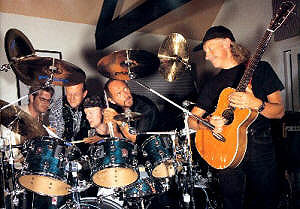
MB: (laughter) I’ve played flute as long as I’ve played
guitar which is sort of forty years and I don’t often get to
play flute, for obvious reasons (laughter) and I just like to...it’s
the thing for me. I like to have some flute. I mean I could play a
lot more but then people would draw comparisons and well I have to
say, in all honesty, I couldn’t touch Ian with a branch pole
with my flute playing. I hardly ever pick the thing up. But I’ve
always really liked playing the flute, from before I met Ian so I
quite like to at least have one representation of it on each album.
MWE3: I also really love the Stage Left song “Winter Snowscape”
and you mentioned there’s another version on the coming Tull
Christmas CD.
MB: That’s right. I wrote the main melody in one go and I demo’d
it, sort of very rough, on a cassette. And when Ian first mentioned
doing a Christmas album, I took two acoustic demos along to Ian’s
studio and I said, ‘look if we’re doing a Christmas album,
what about considering these two?’ And one he didn’t like
‘cause it was very bluesy, but “Winter Snowscape’,
he said, ‘that’s great, that’s perfect.’ And funnily
enough when I wrote it, we had working titles and I called it “The
Snowman” just because when you write something you have some
sort of image or some sort of feeling about the piece of music and
it always felt Christmas-y to me so it fitted straight into place.
The other section of the music I wrote later and then I sent the whole
track over to Ian and he added flute to the existing guitars on it.
MWE3: Also the Stage Left track “Nelly Returns” is
another Tull-inspired track.
MB: Yeah. The two tracks that were written quite a while ago, “Nelly”
and “Murphy’s Law”, have been stage instrumentals.
I think “Nelly” was written actually about five years ago.
I never recorded it. It was written for a stage instrumental and so
that was sort of brought back to life for the album and “Murphy’s
Law” is the same. It was written about three years ago as a stage
instrumental so it was quite important for me to get those down onto
record and those are the only two tracks that I didn’t write
at the time of doing the album.
MWE3: And another cool acoustic moment on Stage Left is “I
Raise My Glass To You”.
MB: Yeah...well I was going to do it as a sort of hidden track. But
anyway, I didn’t (laughter). I wrote it and I just thought I
quite like the idea of having something that’s really short,
kind of sweet, a little sort of ending to the album. It was going
to be the last track but it isn’t. My brain’s left my body!
I quite like bits of music, sort of thirty seconds or a minute...it
says what it says and then it’s over.
MWE3: The final song on Stage Left, “Don’t Say A
Word” is a great song. It’s also the album’s only vocal.
MB: I’m sort of a bit self-conscious of instrumental albums.
You mentioned that you love guitar instrumental albums. Obviously,
I’ve listened to lots of them. I’m always conscious of trying
to keep the listeners interested. That’s why I’ve never
done a blues album or a folk album, or a rock and roll album. All
my solo albums have been quite diverse in styles. It’s the way
I am when I listen to music and certainly when I write. I just can’t
sort of get into one groove and stay there. If I write a piece of
folk-y music one day, the next day I’ll wake up and it’ll
be a blues. I suppose I have a very short attention span and I always
presume that the listener also...I don’t want them to get fed
up going in one direction so I quite like going here, there and everywhere.
Because the other two albums have had vocal tracks on them I sort
of felt a bit of an obligation to have one on this one. I’m not
very comfortable with writing lyrics so I put it off to the very last
moment (laughter) and I had a friend do the vocals on it ‘cause
I didn’t know anybody else. I hadn’t anybody in mind to
come and do the vocals and I didn’t really didn’t want to
get anybody really well known. So this guy is a local friend of mine
and he came and sort of sung his heart out, God bless him.
MWE3: Is is hard to come up with song titles for instrumental music?
MB: No, I didn’t find it difficult. I never want it to be a throwaway
thing where I’ll call this one, blah, blah...whatever. I put
a lot of thought into it. I suppose it’s easy to be a bit of
a smart-ass, come up with things that are a bit wacky. I mean, I hope
it means something to me, it has a connection for some reason. Whether
it’s something the music reminds me of or it’s just sort
of a train of thought I had at the time. Obviously, (laughter) it
won’t mean the same to the listener. It’s difficult...I
suppose if you’re a classical writer, you’ve got it easy...you
just say it’s Concerto No. 53 in A Minor...(laughter) I think
of classical music...if you’ve got a “Eroica” or “Enigma
Variations” and “Italian Symphony”...I really like
that because I think, in your mind, you have your own connection.
You have your own way of connecting the title with the piece of music.
It might be totally different from the way the composer was connecting
(laughter) the two things but I think it’s a bit impersonal to
just have a number and a key. So I like the idea of titling pieces
of music.
MWE3: I love the title of the first song on Stage Left. “Count
The Chickens”. (laughter)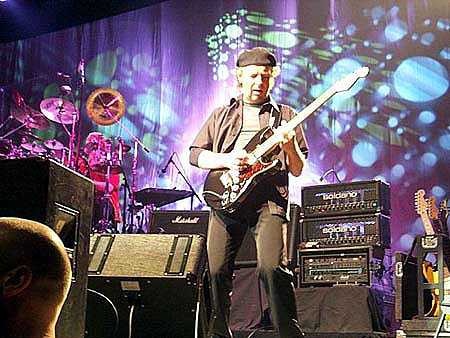
MB: Ah, right. I tell everybody there’s a reason why it’s
called that, but nobody’s figured it out. So I might run a competition
and see who the first one is...There is a reason it’s called
that. It has something to do with the music. It made me laugh when
I thought of it because it’s something within the actual musical
notes. I’m sure somebody will figure it out.
MWE3:
Speaking of titles and album titles, I was always amazed by the titles
of the Jethro Tull albums. For instance, can you recall how the band
came up with the title for the Benefit album?
MB: I’ve got to really stretch my mind to remember why, but I
think possibly because the music was for the benefit of the listener.
I think, (laughter) but I can’t remember that far back.
MWE3: Sorry bout that...
MB: Oh, don’t worry, I like being tested. But you’re right.
We put lots of thought into the titles, the presentation of the album,
the covers. I think, traditionally, we will always put lots of work...you
remember Thick As A Brick? There’s probably as much work
in the cover as there was in the music. It’s the icing on the
cake to me. I really enjoyed putting the cover together. You probably
don’t (yet) have a cover for Stage Left.
MWE3: I just have the advance record company CD.
MB: That’s a shame because the cover is a flight case, which
is where Stage Left obviously comes from where I’ve been...
I’ve stood on stage left for thirty five years.
TCG: To the left of Ian...
MB: That’s right. The cover is actually a flight case, ‘cause
the flight cases have my name and ‘stage left’ written on
them. And also, hopefully, if it all comes together we’ll have
the texture of the flight case as well so you’ll actually feel
like you’re opening the flight case to get the CD. I took a lot
of pleasure in thinking about the cover as well. All these things
are fun to do. Once you’ve done the music, it’s nice to
sit back and do things that are a bit diverse...titles of bits of
music, sort of liner notes and the way you want the cover to look.
I think those are the easy parts of it.
MWE3: I was reading when you were young, after you bought your first
guitar, your father gave you some album by Wes Montgomery and Barney
Kessell. Did those jazz albums kind of inspire you to want to play
guitar?
MB: I don’t even know if I still have them...I wonder if I do.
I listened to them and they didn’t inspire my in the way that
I think you want me to say in as much as I learned how to play then.
I have to be honest...I never really liked jazz that much. In fact,
I think I liked jazz flute because I used to buy Frank Wess and Roland
Kirk, as everybody did.
MWE3: Frank Wes..?
MB: Wess, is it? I think he played flute for Count Basie or Duke Ellington.
It’s just a name that I remember. I might be wrong. But I think
I was more influenced by jazz flute playing than I was by jazz guitar
playing. Mostly, the reason is, when I started learning, there was
no rock guitar. I mean, so little rock guitar other than Scotty Moore,
The Ventures, The Shadows...
MWE3: The Shadows...That was really pre-Beatles England.
MB: It was.
MWE3: So Hank Marvin must have been an early influence in a way.
MB: He was...but by default. That’s what everybody played. If
you were in a group and you were doing gigs, that’s the music
you played (laughter) in order to work and it’s changed over
the years. As soon as the blues started coming over in drips and drabs,
you had Freddy King and B.B. King and Buddy Guy....It was such an
impact because there were all these guitar players that only had access
to these sort of very basic, uninteresting forms of guitar playing.
I’m not sort of saying that The Shadows and The Ventures (laughter)
weren’t good players but, it wasn’t enough and I think people
were hungry for inspiration and finally the blues and R&B and
soul, you know James Brown, I mean it was all, had such a huge impact
on English musicians because they hadn’t heard it before. So
from that point, guitar playing just took off in England and that’s
why, when I turned professional, I played saxophone. I couldn’t
get a gig as a guitar player because nobody wanted a guitar player.
They only wanted brass sections because they were playing Wilson Pickett
and Otis Redding. So I played tenor sax for a couple of years. And
then when the blues started coming in big in England, and there was
John Mayall, Clapton was playing and Hendrix started playing...guitar
was just, wow! (laughter) It was back to guitar. Back with a vengeance.
MWE3: With regards to The Shadows, I feel instrumental rock music
never really gained the respect in the U.S. that it did in England.
MB: But then that in itself is by default. It’s only because
that’s all we had. It wasn’t cause we liked it (laughter)
in particular. I’m not saying, I’m not a Cliff Richard fan,
but whatever was out in the music stores...I bought it, if it had
guitar on it, I learned it. There was so little choice, I just bought
everything I could. And again, going back to listening to jazz, there
wasn’t much else to listen to, but at least it was guitar playing,
and (I was thinking) yeah, I want to play guitar, but I don’t
want to be like Barney Kessel (laughter). I couldn’t be like
Barney Kessel in four hundred years and I really loved what he played
and I loved Wes Montgomery, Kenny Burrell, Tal Farlow, I mean (laughter)
there’s so many other...They’re great players but I didn’t
want to play that music. I wanted something else and I didn’t
know what it was until R&B and soul, blues hit England. And then
I thought, ‘yep (laughter) that’s me, this is what I want
to be like.’
MWE3: In Europe, in the mid ‘70s instrumental music sort of became
a common language of sorts.
MB: Yeah...I suppose, but there again in the mid ‘60s when I
started through to the late ‘60s and the early ‘70s music
in Europe, there was only English and American music. There was no
European music because it didn’t exist. There were no German
bands, Italian bands...
MWE3: Yeah, I guess at that time, yeah...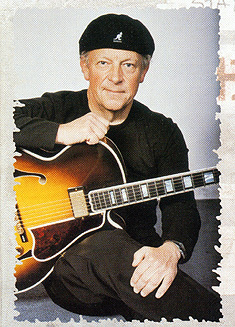
MB: It was all Western music. Nobody was interested in anything else.
It wasn’t that, but I think...instrumental music wasn’t
big in England. People played like Jerry Lee Lewis, Little Richard,
Chuck Berry. That was the music that was big in England. And it was
more vocal-based. But I mean for a very, very short period it was
instrumental...The Shadows. For guitar players, that’s all there
was. The bands, the groups that were going out gigging, it was the
rock and roll music that they had to go out and play.
MWE3: It was an innocent time I guess.
MB: It was...it’s the opposite of the way it is today. Thousands
of guitar players desperately trying to find something to listen to,
to learn from. But now, there’s too much to learn from. You can
go out and learn to play like Joe Satriani and buy all his videos
and the books and, but then, and it’s great, what a great player
but then they’re not being influenced by the simple music forms
like the blues, with so many players that I came across. And they’re
not very good rhythm players, they don’t have good time. They
haven’t got good feel. And they haven’t learned to do it.
They haven’t learned to play a twelve bar blues, to have really
great placements of notes. They just want to go straight to the top
of the tree. And that’s...a shame.
MWE3: Did George Harrison have an impact on your playing?
MB: Well, he did because everybody, me included, we learned all the
Beatles songs. When you did gigs, you played to the crowd and the
crowd wanted Beatles songs. Everybody learned his guitar parts. (laughter)
I think he had...he has and had a lot of respect as a guitar player
because he was very much like the guitar players are in Oasis, Matchbox
20 or Counting Crows. They are a team player and they are playing
rhythm parts, not just solos and in your face riffs. It’s also
very supportive. And that side of guitar playing is vital. You can’t
always be playing flat-out solos and riffs all your life. You’ve
got to learn to play a supportive part in a band and he was one of
those innovators of playing a part. It was a part in a piece of bigger
music. And as I said earlier, I think people have to learn how to
do that.
MWE3: Yes I’ve been asking some of the greatest players about
George.
MB: He was a very important part of the English music scene. He was
an important guitar player and still is.
MWE3: On a Beatles related note, you just missed out playing alongside
Lennon and the Stones at the Rock And Roll Circus show. You joined
Tull right after they did that.
MB: Yeah...it wasn’t a great occasion, I must say. I missed out
on that yet then I played with McCartney for a week in the studio
so I got to do it eventually.
MWE3: When did you get to play with McCartney?
MB: It was during work on Flowers In The Dirt, is it? Yeah,
so I did some playing with him then and then I think a couple things
that we did were released in Japan, but I’m afraid, not anywhere
else.
MWE3: Oh, it came out in Japan?
MB: Yeah, I thought it had and I don’t have any information.
Somebody sent me a cassette of a b-side of a single that was released
in Japan and it’s got me on it.
MWE3: Oh, wow.
MB: But I’ve got no idea what’s it’s called. I haven’t
actually seen the finished product. If anybody ever finds out about
that, I’d love to know (laughter).
MWE3: I’ll have to dig around for that.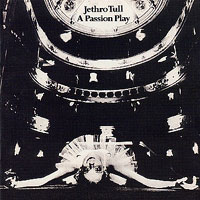
MB: But it was my dream, you know? He was my hero. The Beatles were
our heroes and then sort of thirty years down the line, I’m playing
with the guy! You’re in awe of it all, it’s just like...it’s
almost too much to contemplate.
MWE3: I was reading about how the English might not have been ready
yet when Tull went from the blues of the first album This Was
to the gothic rock sound of Stand Up and you’ve spoken
of one special gig at Manchester University in 1969 as a turning point
in the band’s history.
MB: It was and it was terrifying and I think it was for Ian as well,
because he decided he didn’t want to be another blues musician
amongst hundreds of them, another blues band. He wanted to write music,
write songs and perform them. That’s what he wanted to do and
people didn’t like it because Jethro Tull was a blues band and
Mick Abrahams was a blues guitar player and they loved it. They loved
Mick and they loved the music and suddenly here was Jethro Tull with
another guy playing guitar (laughter) and it wasn’t the blues
anymore. (It was like) What’s happened, where’s it going?
(laughter) And they didn’t like it. Whatever...but they made
the adjustment, they thought, ‘it’s good stuff. It’s
not the blues, but hey, we like it anyway!’
MWE3: Okay can you mention any future plans?
MB: Future plans for me, I really want to get on the road with a band,
with my band. I’ve done it once, about four years ago in Germany
and I’m really keen to start playing live and playing my own
stuff. Jethro Tull will continue, I hope (laughter). I’m sure
it will into the next few years. But I really want to sort of get
my foot in the door of playing in the States and playing in Europe
with my own music. So that’s my wish. More solo albums and lots
more guitar playing.
MWE3: Will there be any more DVD’s coming?
MB: I don’t think so because we just have problems with the older
material and maybe they’ll be resolved. It’d be really nice
to get all the really old historical footage out onto DVD. We have
problems, and I won’t go into it but, with original members...anyway
we just have personal problems and it’s a real shame because
I think it’d be really, really good to get that stuff out.
MWE3: Well sooner or later...
MB: Yeah...sooner or later it will happen, but not at the moment (laughter).
Thanks to Martin Barre @ www.MartinBarre.com,
Anne Leighton - Capitol / EMI and Fuel 2000 - www.Fuel2000.com
